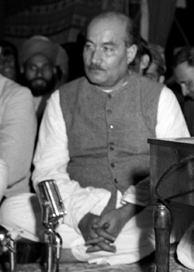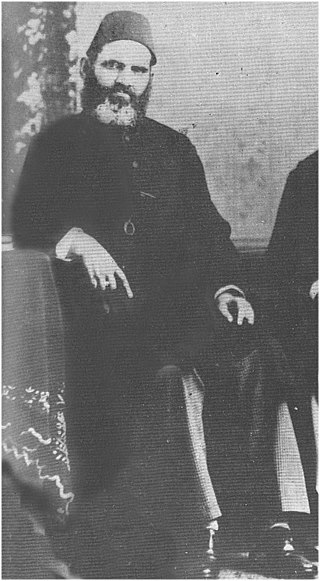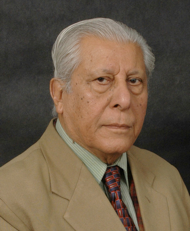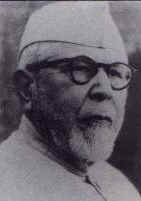Related Research Articles

Sir Syed Ahmad Khan, also spelled Sayyid Ahmad Khan, was an Indian Muslim reformer, philosopher, and educationist in nineteenth-century British India.

The All-India Muslim League (AIML), simply called the Muslim League, was a political party established in Dhaka in 1906 when some well-known Muslim politicians met the Viceroy of India, Lord Minto, with the goal of securing Muslim interests in British India.

Jamaat-e-Islami Pakistan (JIP), is a Pakistani Islamist political party. The aim of this political party is to make Pakistan an Islamic state, governed by Sharia law, through a gradual legal, and political process. It opposes capitalism, liberalism, socialism and secularism as well as economic practices such as offering bank interest. It is the Pakistani successor to Jamaat-e-Islami, which was founded in colonial India in 1941. JIP is a "vanguard party", whose members are intended to be leaders spreading party beliefs and influence. Supporters not thought qualified to be members may become "affiliates", and beneath them are "sympathizers". The party leader is called an "ameer". Although, it does not have a large popular following, the party is quite influential and considered one of the major Islamic movements in Pakistan, along with Deobandi and Barelvi.

Syed Fazl-ul-Hasan, known by his pen-name Hasrat Mohani, was an Indian activist, freedom fighter in the Indian independence movement and a noted poet of the Urdu language. He coined the notable slogan Inquilab Zindabad in 1921. Together with Swami Kumaranand, he is regarded as the first person to demand complete independence for India in 1921 at the Ahmedabad Session of Congress. Maghfoor Ahmad Ajazi supported the complete independence motion demanded by Hasrat Mohani. He wrote the famous ghazal 'Chupke chupke raat din' which was depicted in the 1982 Bollywood movie 'Nikaah' and sung by Pakistani singer Ghulam Ali.

Shibli Nomani was an Islamic scholar, poet, philosopher, historian, educational thinker, author, orator, reformer and critic of orientalists from Indian subcontinent during the British Raj. He is regarded as the father of Urdu historiography. He was also proficient in Arabic and Persian languages. Shibli was associated with two influential movements in the region, the Aligarh and the Nadwa movements. As a supporter of the Deobandi school, he believed that English language and European sciences should be incorporated into the education system. Shibli wrote several biographies of Muslim heroes, convinced that Muslims of his time could learn valuable lessons from the past. His synthesis of past and modern ideas contributed significantly to Islamic literature produced in Urdu between 1910 and 1935. Shibli established the Darul Musannefin Shibli Academy in 1914 to promote Islamic scholarship and also founded the Shibli National College in 1883. He collected much material on the life of Muhammad, and completed the first two volumes of the planned work, Sirat al-Nabi. His disciple, Sulaiman Nadvi, added to this material and wrote the remaining five volumes after Shibli's death.

From a historical perspective, Professor Ishtiaq Ahmed of the University of Stockholm and Professor Shamsul Islam of the University of Delhi classified the Muslims of Colonial India into two categories during the era of the Indian independence movement: nationalist Muslims and Muslim nationalists. The All India Azad Muslim Conference represented nationalist Muslims, while the All-India Muslim League represented the Muslim nationalists. One such popular debate was the Madani–Iqbal debate.

Josh Malihabadi popularly known as Shayar-e-Inqalab was a Pakistani Urdu poet, born in Malihabad, British India.

Nawab Mohsin-ul-Mulk, Munir Nawaz Jang, also known as Syed Mir Mehdi Ali, was an Indian Muslim politician. He was a close friend of Syed Ahmed Khan, was involved in the Aligarh Movement and was one of the founders of the All India Muslim League in 1906.

SirZiauddin Ahmad was an Indian mathematician, parliamentarian, logician, natural philosopher, politician, political theorist, educationist and a scholar. He was a member of the Aligarh Movement and was a professor, principal of MAO College, first pro vice-chancellor, vice chancellor and rector of Aligarh Muslim University, India.

Maulvi Abdul Haq was a scholar and a linguist, who some call Baba-e-Urdu. Abdul Haq was a champion of the Urdu language and demanded for it to be made the national language of Pakistan.

Jamal Khwaja was an Indian philosopher.

Abdul Majeed Khwaja was an Indian lawyer, educationist, social reformer and freedom fighter from Aligarh. In 1920, he along with others founded Jamia Millia Islamia and later served its vice chancellor and chancellor.

Aligarh Muslim University is a collegiate, central, and research university located in Aligarh, Uttar Pradesh, India, which was originally established by Sir Syed Ahmad Khan as the Muhammadan Anglo-Oriental College in 1875. Muhammadan Anglo-Oriental College became Aligarh Muslim University in 1920, following the Aligarh Muslim University Act.
The Aligarh Movement was the push to establish a modern system of Western-style scientific education for the Muslim population of British India, during the later decades of the 19th century. The movement's name derives from the fact that its core and origins lay in the city of Aligarh in Central India and, in particular, with the foundation of the Muhammadan Anglo-Oriental College in 1875. The founder of the oriental college, and the other educational institutions that developed from it, was Sir Syed Ahmed Khan. He became the leading light of the wider Aligarh Movement.
Muhammadan Anglo-Oriental College was founded in 1875 by Sir Syed Ahmad Khan, initially as a primary school, with the intention of turning it to a college level institution. It was inspired by the Cambridge education system. It started operations on Queen Victoria's 56th birthday, 24 May 1875.

Opposition to the Partition of India was widespread in British India in the 20th century and it continues to remain a talking point in South Asian politics. Those who opposed it often adhered to the doctrine of composite nationalism in the Indian subcontinent. The Hindu, Christian, Anglo-Indian, Parsi and Sikh communities were largely opposed to the Partition of India, as were many Muslims.

Composite nationalism is a concept that argues that the Indian nation is made up of people of diverse ethnicities, cultures, tribes, castes, communities, and faiths. The idea teaches that "nationalism cannot be defined by religion in India." While Indian citizens maintain their distinctive religious traditions, they are members of one united Indian nation. Composite nationalism maintains that prior to the arrival of the British into the subcontinent, no enmity between people of different religious faiths existed; and as such these artificial divisions can be overcome by Indian society.
Tufail Hoshiarpuri was a film song lyricist and a poet from Pakistan.

The history of Aligarh Muslim University begins with the Aligarh movement, which was a movement to establish a Western style of education for the Muslims of British India. The movement was pioneered by Sir Syed Ahmed Khan, who founded the Muhammadan Anglo Oriental College in Aligarh. Sir Syed retired at Aligarh, and undertook the charge of raising funds for the college, and supervising the construction of the campus.
References
- 1 2 3 4 5 6 7 8 Dhulipala, Venkat (9 February 2015). Creating a New Medina. Cambridge University Press. p. 290. ISBN 978-1-107-05212-3.
- 1 2 3 4 5 6 7 "Syed Tufail Ahmad Manglori". The Milli Gazette . 26 November 2013. Retrieved 3 November 2020.
- ↑ Ashraf, Ajaz (6 September 2016). "The forgotten story of two Maulanas who mocked Jinnah's idea of Pakistan". Scroll.in . Retrieved 3 November 2020.
- ↑ Sajjad, Mohammad (24 May 2018). "The real culprits behind India's Partition". Rediff . Retrieved 3 November 2020.